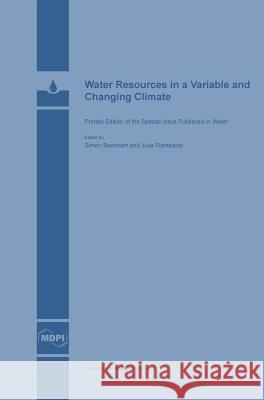Water Resources in a Variable and Changing Climate » książka
Water Resources in a Variable and Changing Climate
ISBN-13: 9783038420835 / Angielski / Twarda / 2015 / 342 str.
Climate change will bring about significant changes to the capacity of, and the demand on,
water resources. The resulting changes include increasing climate variability that is expected
to affect hydrologic conditions. The effects of climate variability on various meteorological
variables have been extensively observed in many regions around the world. Atmospheric
circulation, topography, land use and other regional features modify global changes to
produce unique patterns of change at the regional scale. As the future changes to these water
resources cannot be measured in the present, hydrological models are critical in the planning
required to adapt our water resource management strategies to future climate conditions.
Such models include catchment runoff models, reservoir management models, flood
prediction models, groundwater recharge and flow models, and crop water balance models. In
water-scarce regions such as Australia, urban water systems are particularly vulnerable to
rapid population growth and climate change. In the presence of climate change induced
uncertainty, urban water systems need to be more resilient and multi-sourced. Decreasing
volumetric rainfall trends have an effect on reservoir yield and operation practices. Severe
intensity rainfall events can cause failure of drainage system capacity and subsequent urban
flood inundation problems. Policy makers, end users and leading researchers need to work
together to develop a consistent approach to interpreting the effects of climate variability and
change on water resources.
This Special Edition includes papers by international experts who have investigated climate
change impacts on a variety of systems including irrigation and water markets, land use
changes and vegetation growth, lake water levels and quality and sea level rises. These
investigations have been conducted in many regions of the world including the USA, China,
East Africa, Australia, Taiwan and the Sultanate of Oman.
Climate change will bring about significant changes to the capacity of, and the demand on,
water resources. The resulting changes include increasing climate variability that is expected
to affect hydrologic conditions. The effects of climate variability on various meteorological
variables have been extensively observed in many regions around the world. Atmospheric
circulation, topography, land use and other regional features modify global changes to
produce unique patterns of change at the regional scale. As the future changes to these water
resources cannot be measured in the present, hydrological models are critical in the planning
required to adapt our water resource management strategies to future climate conditions.
Such models include catchment runoff models, reservoir management models, flood
prediction models, groundwater recharge and flow models, and crop water balance models. In
water-scarce regions such as Australia, urban water systems are particularly vulnerable to
rapid population growth and climate change. In the presence of climate change induced
uncertainty, urban water systems need to be more resilient and multi-sourced. Decreasing
volumetric rainfall trends have an effect on reservoir yield and operation practices. Severe
intensity rainfall events can cause failure of drainage system capacity and subsequent urban
flood inundation problems. Policy makers, end users and leading researchers need to work
together to develop a consistent approach to interpreting the effects of climate variability and
change on water resources.
This Special Edition includes papers by international experts who have investigated climate
change impacts on a variety of systems including irrigation and water markets, land use
changes and vegetation growth, lake water levels and quality and sea level rises. These
investigations have been conducted in many regions of the world including the USA, China,
East Africa, Australia, Taiwan and the Sultanate of Oman.











